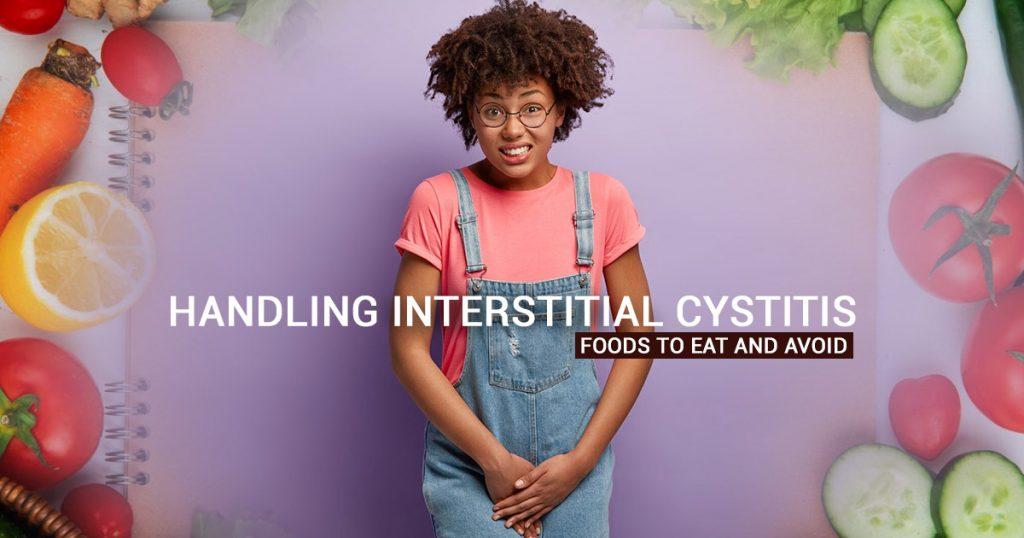A healthy diet is crucial for keeping our bodies in good shape. We get the nutrition we require from it to function properly every day. Lean meats, whole grains, fruits, vegetables, and healthy fats are all part of a balanced diet. This variety guarantees that we receive the vitamins and minerals required for growth, repair, and energy. The World Health Organization indicates that eating a nutrient-rich diet can lower the risk of chronic diseases.
When you’re dealing with an illness, a healthy diet becomes even more important. Special dietary plans are often needed to tackle specific health issues, whether they affect the digestive system, respiratory system, or urinary system. For those with interstitial cystitis (IC) what you eat can greatly impact your symptoms and quality of life. Knowing which foods to avoid and following helpful dietary tips can make a big difference in managing IC symptoms.
What is Interstitial Cystitis?
Interstitial cystitis (IC) is a long-term condition that causes pain and pressure in the bladder. People with IC often feel like they need to urinate frequently, even if their bladder isn’t full. Pain can affect everyday activities and range in intensity from mild discomfort to severe pain.
When someone has IC, they might experience:
- Bladder Pain: Ongoing pain in the bladder area.
- Frequent Urination: Needing to go to the bathroom more often than usual.
- Urgency: A sudden, intense urge to urinate.
- Pelvic Discomfort: Pain or pressure in the lower belly or pelvic area.
IC not only causes physical pain but can also affect sleep, work, social life, and emotional health. It requires careful management to keep symptoms under control.
Is an Interstitial Cystitis Diet Needed?
Yes, diet is very important for managing IC symptoms. Certain foods and drinks can make IC symptoms worse, so changing what you eat can help a lot. A large range of foods and beverages can cause sensitivities in almost 90% of individuals with interstitial cystitis/bladder pain syndrome (IC/BPS), according to research published in BJUI International. People with IC can improve their quality of life and lessen pain and discomfort by recognizing and avoiding these trigger foods.
Food Restrictions for Interstitial Cystitis
Firstly, there are foods that people with interstitial cystitis should not eat. Here are some common items to avoid and why they are bad for people with IC:
- Coffee and Tea: Both regular and decaf can irritate the bladder because of their acidity and caffeine.
- Soda and Alcohol: These drinks can cause bladder discomfort and make you feel like you need to urinate more often.
- Citrus Juices and Cranberry Juice: The high acidity in these juices can make bladder pain and inflammation worse.
- Spicy Foods: Hot peppers and spicy seasonings can irritate the bladder and cause discomfort.
- Tomatoes and Tomato Products: The acidity in tomatoes can aggravate IC symptoms.
- Artificial sweeteners: Often found in diet sodas and snacks, these can cause symptoms and bladder irritation.
- Chocolate: Contains caffeine and is acidic, which can lead to bladder irritation.
By avoiding these foods and drinks, people with IC can help reduce their symptoms and manage the condition more effectively.
Recommended Foods for Interstitial Cystitis
In addition to foods that should be avoided, there are foods that can alleviate the symptoms of interstitial cystitis. Here are some foods that are good for people with IC and how they help:
- Water: Drinking plenty of water helps keep urine diluted and reduces bladder irritation.
- Fruits with Low Acidity: Compared to citrus fruits, fruits such as blueberries, pears, bananas, and watermelon are less likely to irritate the bladder.
- Vegetables: Non-acidic veggies like broccoli, asparagus, carrots, and squash provide important nutrients without causing bladder issues.
- Lean Proteins: Chicken, turkey, and fish give the body needed protein for muscle repair and overall health, without bothering the bladder.
- Whole Grains: Foods like brown rice, oats, and quinoa are gentle on the bladder and help with digestive health.
- Herbal Teas: Chamomile or peppermint teas can be soothing and are a good alternative to regular tea or coffee.
- Dairy Products: Milk, mild cheeses, and yogurt usually don’t irritate the bladder and offer calcium and vitamin D.
- Healthy Fats: Olive oil, flaxseed oil, and avocados have healthy fats that support cell function and reduce inflammation.
Adding these foods to your diet can help manage IC symptoms and improve your overall health.
Managing Interstitial Cystitis with Diet and Lifestyle
Managing interstitial cystitis is not just about avoiding certain foods; it also involves eating the right ones. By steering clear of bladder irritants like coffee, soda, and spicy foods, and incorporating supportive choices like water, low-acid fruits, and lean proteins, you can help reduce IC symptoms and improve your quality of life.
Healthy living, though, entails more than just diet. For the purpose of managing IC, regular exercise, stress reduction, and adequate sleep are all crucial. Exercise can boost overall health and reduce stress, which can trigger IC flare-ups. It can be especially beneficial to engage in yoga or light stretching.
Stress management techniques, such as mindfulness meditation, deep breathing exercises, and regular relaxation activities, can also make a big difference. Furthermore, adequate restful sleep is necessary for the body to heal and function properly.
A diet tailored to your individual needs is the best treatment for interstitial cystitis. You can identify specific triggers and helpful foods by keeping a food diary to track what you eat and how it affects your symptoms. A dietitian or healthcare professional close by can also offer individualized direction and assistance.
